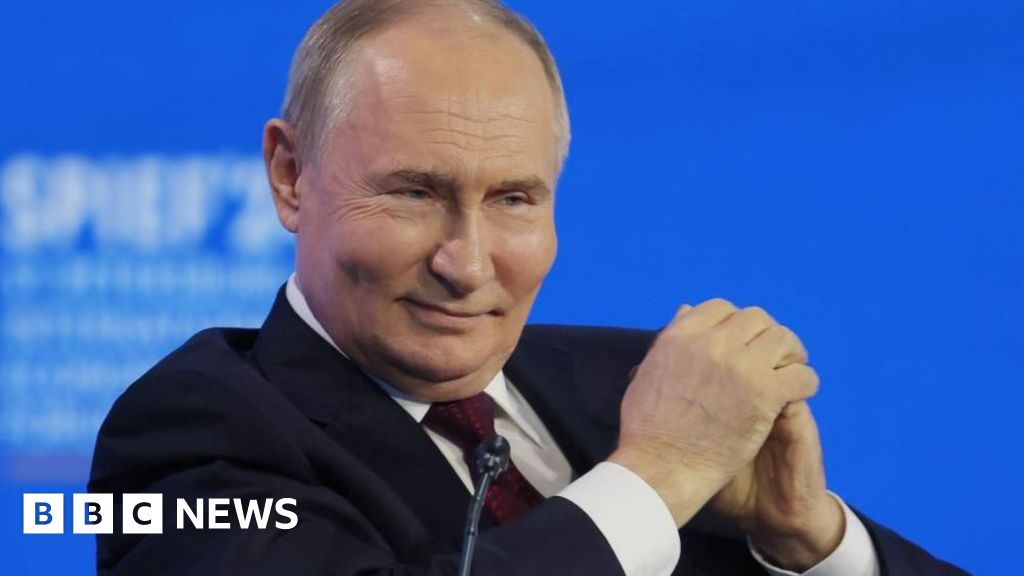World
Confident Putin warns Europe is ‘defenceless’ – BBC News

- Author, Steve Rosenberg
- Role, Russia editor
Ever since Russia’s full-scale invasion of Ukraine, Moscow has been engaged in nuclear sabre-rattling, dropping a series of not-so-subtle hints that trying to defeat a nuclear power like Russia could have disastrous consequences for those who try.
Today President Putin claimed that Russia wouldn’t need to use a nuclear weapon to achieve victory in Ukraine.
He was being interviewed at a panel discussion at the St Petersburg International Economic Forum: the annual event often described as ‘Russia’s Davos’.
There are few occasions when Mr Putin looks dovish compared to the person asking him the questions.
But when the person asking the questions is Sergei Karaganov it would be hard not to. Mr Karaganov is a hawkish Russian foreign policy expert. Last year he called for a pre-emptive nuclear strike. Today he suggested holding a “nuclear pistol” to the temple of the West over Ukraine.
President Putin wasn’t so extreme in his language.
The Kremlin leader said he did not rule out changes to Russia’s nuclear doctrine: the document which sets out the conditions under which Russia would use nuclear weapons.
“This doctrine is a living tool and we are carefully watching what is happening in the world around us and do not exclude making changes to this doctrine. This is also related to the testing of nuclear weapons.”
And he delivered a warning to those European countries who’ve been supporting Ukraine: Russia’s has “many more [tactical nuclear weapons] than there are on the European continent, even if the United States brings theirs over.”
“Europe does not have a developed [early warning system],” he added. “In this sense they are more or less defenceless.”
Tactical nuclear weapons are smaller warheads designed to destroy targets without widespread radioactive fallout.
This has been a surreal week in St Petersburg. On the one hand, a huge international economic forum has been taking place , sending the message that Russia is ready for cooperation and that, despite everything, it’s business as usual.
Clearly, though, it is not business as usual. Russia is waging war in Ukraine, a war which is now in its third year; as a result, Russia is the most heavily sanctioned country in the world.
And, right now, tensions are soaring between Russia and the West.
Earlier this week, at a meeting with international news agency chiefs in St Petersburg, President Putin suggested that Russia might supply advanced conventional long-range weapons to others to strike Western targets.
This was his response to Nato allies allowing Ukraine to strike Russian territory with Western-supplied weapons.
He repeated the idea again today.
“We are not supplying those weapons yet, but we reserve the right to do so to those states or legal entities which are under certain pressure, including military pressure, from the countries that supply weapons to Ukraine and encourage their use on Russian territory.”
There were no details. No names.
So, to which parts of the world might Russia deploy its missiles?
“Wherever we think it is necessary, we’re definitely going to put them. As President Putin made clear, we’ll investigate this question,” Vladimir Solovyov, one of Russian state TV’s most prominent hosts, tells me.
“If you are trying to harm us you have to be pretty sure we have enough opportunities and chances to harm you.”
“In the West some will say we’ve heard this sabre-rattling before,” I respond, “and that it’s a bluff.”
“It’s always a bluff. Until the time when it is not,” Mr Solovyov replies. “You can keep thinking that Russia is bluffing and then, one day, there is no more Great Britain to laugh at. Don’t you ever try to push the Russian bear thinking that ‘Oh, it’s a kitten, we can play with it.”
CEOs from Europe and America used to flock to the St Petersburg International Economic Forum. Not any more. Instead I saw delegations from Asia, Africa, the Middle East and South America. Russia has been using this year’s event to try to show that, despite Western sanctions, there are plenty of countries in the world who are ready to do business with Russia.
And what have we learnt in St Petersburg about Vladimir Putin?
That he sounds increasingly confident and determined not to back down. He seems to believe that in the current standoff between Russia and the West, it is the West that will blink first.







:max_bytes(150000):strip_icc()/roundup-writereditor-loved-deals-tout-f5de51f85de145b2b1eb99cdb7b6cb84.jpg)


